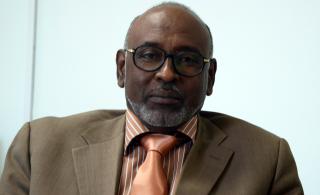Opinion
From the Economic Conference (2): Objectives, Priorities, and Implementation Mechanisms for a Proposed Plan

By Professor Ahmed Magzoub Ahmed
Greetings to the Minister of Finance and Economic Planning, Dr. Jibril Ibrahim, and the leadership responsible for managing economic and financial affairs under complex domestic and international circumstances. They face enormous challenges, extraordinary by any standard, working to revive an economy ravaged by the treacherous hands of rebellion, exploited by the ambitions of foreign powers, and targeted by adversaries from all directions. This requires everyone’s participation in reforming the financial and economic sectors. The convening of the Economic Conference sends a direct message to specialists and experts, inviting them to contribute their insights and shoulder the responsibility of rebuilding their nation. Just as the soldiers of the armed forces and the nation’s martyrs have offered their lives to defend the country, it is the duty of experts and academics to contribute ideas that can restore and elevate the nation’s standing and repair the devastation it has endured.
Continuing from our previous discussion, we emphasize that precisely identifying the current phase’s objectives is the first step toward success, contingent upon an accurate diagnosis of the problem, as previously mentioned.
The Ministry of Finance must lead the ship of economic reform and reconstruction. It is mandated to do so by Sudanese law and systems, including setting goals, developing plans, programs, and projects, and ensuring their implementation on the ground. The ministry must also lead implementation groups across all levels and ensure that all government entities align with these efforts.
Based on the challenges mentioned in the previous article, the overarching goals that could serve as a lifeline for this phase are summarized as follows:
Primary Goals:
1. Rebuilding War-Damaged Infrastructure and Facilities: This includes empowering the private sector to reclaim its role, encompassing financial, banking, productive, service, and commercial institutions.
2. Addressing Unemployment: The war exacerbated unemployment rates and deepened its manifestations. Policies and programs that create opportunities in the private sector, rather than merely creating government jobs, must be adopted.
3. Halting GDP Decline: Efforts should focus on achieving positive growth rates, especially in sectors severely affected by the war (agriculture, industry, and services).
4. Ensuring Economic Stability: Reduce inflation and improve the value of the Sudanese pound without conflicting with the expansive fiscal policies needed for reconstruction and development.
5. Restoring Confidence in the Sudanese Economy: This includes attracting fleeing domestic and foreign capital and creating a conducive environment for investment through stable regulatory frameworks and policies. Reconstruction and development programs will offer a large market to attract investors.
6. Preparing for Reconstruction and Development: This involves prioritizing project files, establishing investment zones under public-private partnerships, and creating new investment hubs in states to stimulate production, achieve economic and social balance, and reduce risks.
7. Rebuilding External Economic Relations: Strengthen governmental and private sector ties in politics, economics, and finance to preserve Sudanese export markets, open new ones, and rebuild correspondent banking networks. Boost cooperation with insurance and guarantee institutions to facilitate financing for reconstruction.
8. Addressing the Budget Deficit: Adopt clear policies for revenues and expenditures, and reschedule domestic and foreign obligations.
9. Securing Financial Resources: Innovate non-traditional financing methods that expand the role of national and foreign private sectors. Strengthen public-private partnerships and establish a legal and institutional framework for these relationships. The conference’s paper on private sector partnerships offers excellent recommendations that should be developed into an actionable plan.
10. Establishing a Competent Executive Body: This body must have modern management tools for planning, implementation, monitoring, and evaluation. It should use advanced technology to tackle challenges and prioritize initiatives during the transitional phase.
11. Fostering Patriotism: Strengthen national unity and solidarity, inspired by the increasing alignment between the people and the armed forces. This unity, evident in volunteers defending the country, represents a foundation for mobilizing and supporting reconstruction programs.
Implementation Mechanisms:
1. Political Support: Build a national front to ensure political stability, overcoming the fragmentation that has plagued the nation. The widespread support for the armed forces in their battle for dignity against modern colonialism—backed, unfortunately, by some treacherous citizens—provides a unique opportunity to unify efforts.
2. Forming a Competent and Independent Government: This government should focus on implementing transitional programs, supported by highly skilled leaders known for their dedication, as this phase cannot afford a fragmented administration.
3. Social Reform Programs: Rebuild the social fabric as a foundation for reconstruction and development. A fractured society cannot thrive, and addressing hate speech and division, which have been exacerbated by external agents and local ignorance, is critical.
4. Establishing an Effective Media System: Develop a robust media apparatus with skilled personnel and platforms to mobilize public opinion in support of reconstruction and development plans.
5. Legislative Reform: Establish respect for the law and ensure justice and equality. Institutions must regain full independence, and the legal distortions of the past five years, which contributed to economic and administrative decline, must be rectified. A stable legal environment will protect investors and safeguard community and worker rights, removing barriers that caused capital flight.
6. Strengthening External Relations: Reinforce ties with friendly countries and independent financial institutions regionally and internationally.
7. Creating a Coordinating Body: This body will oversee the implementation of the plan, ensuring adherence to approved guidelines and addressing obstacles. Implementation steps must proceed simultaneously under an execution matrix.
With my best regards until we meet again to present detailed proposals for each axis, which we consider the foundation for this plan to overcome challenges and achieve these objectives.



